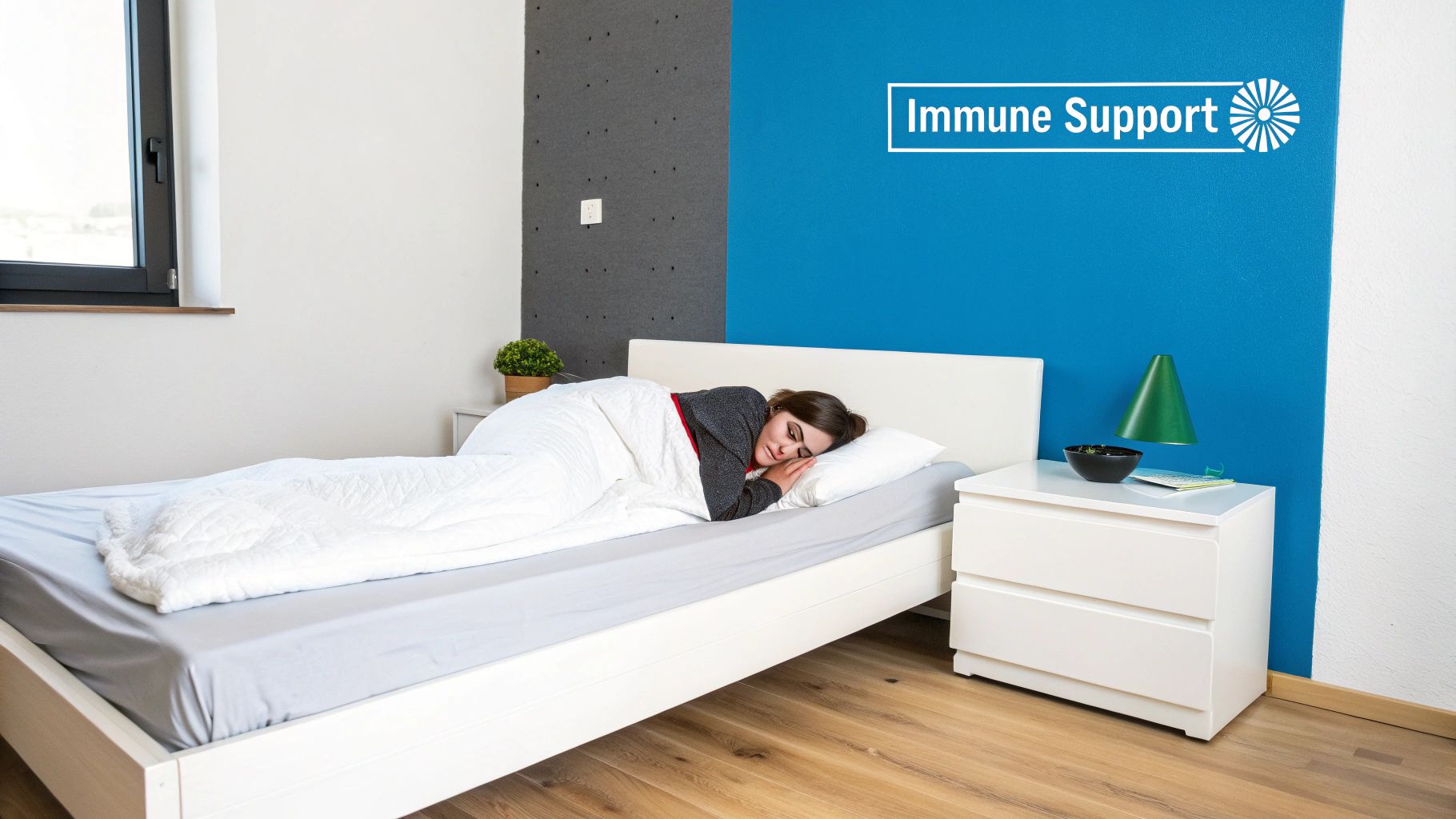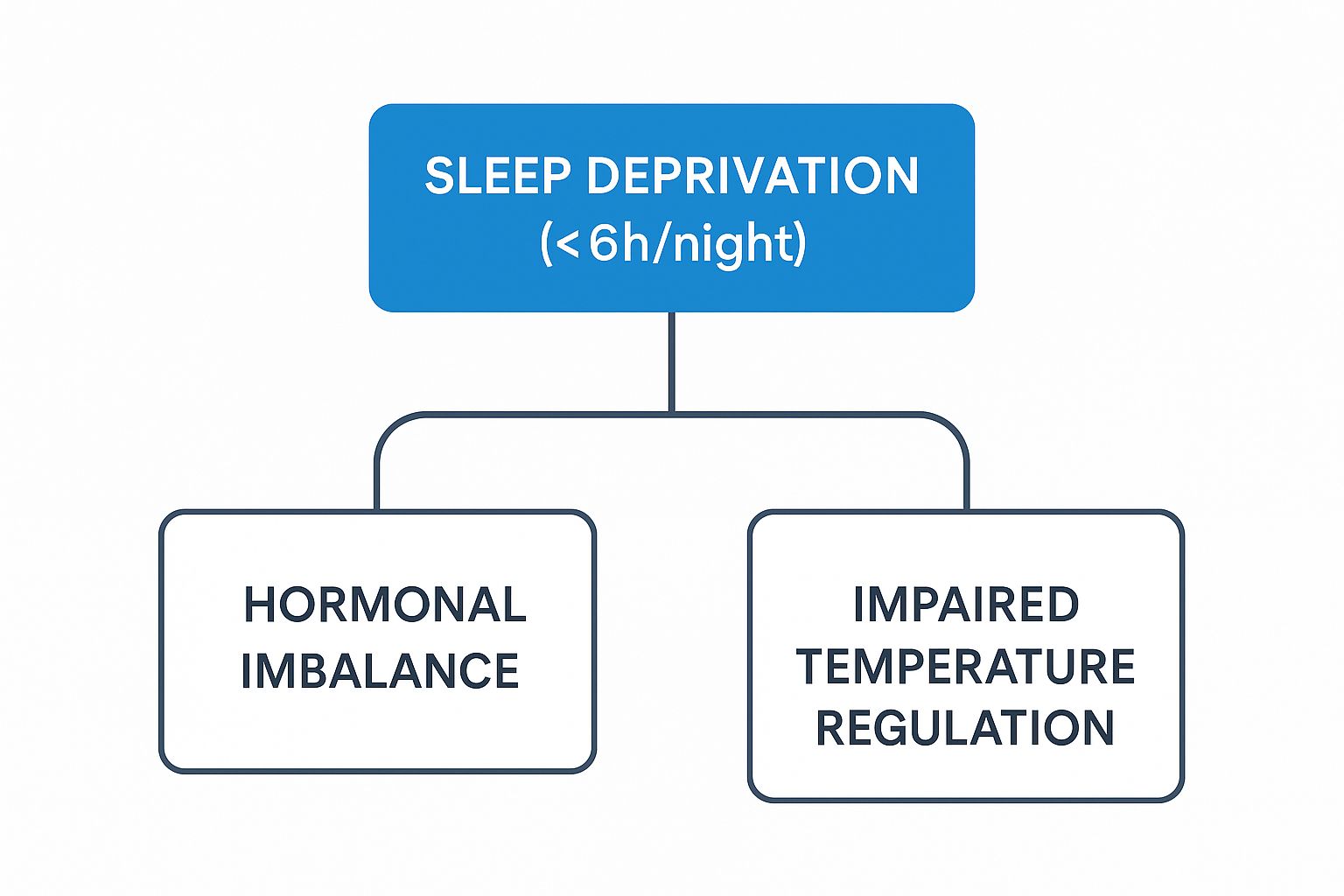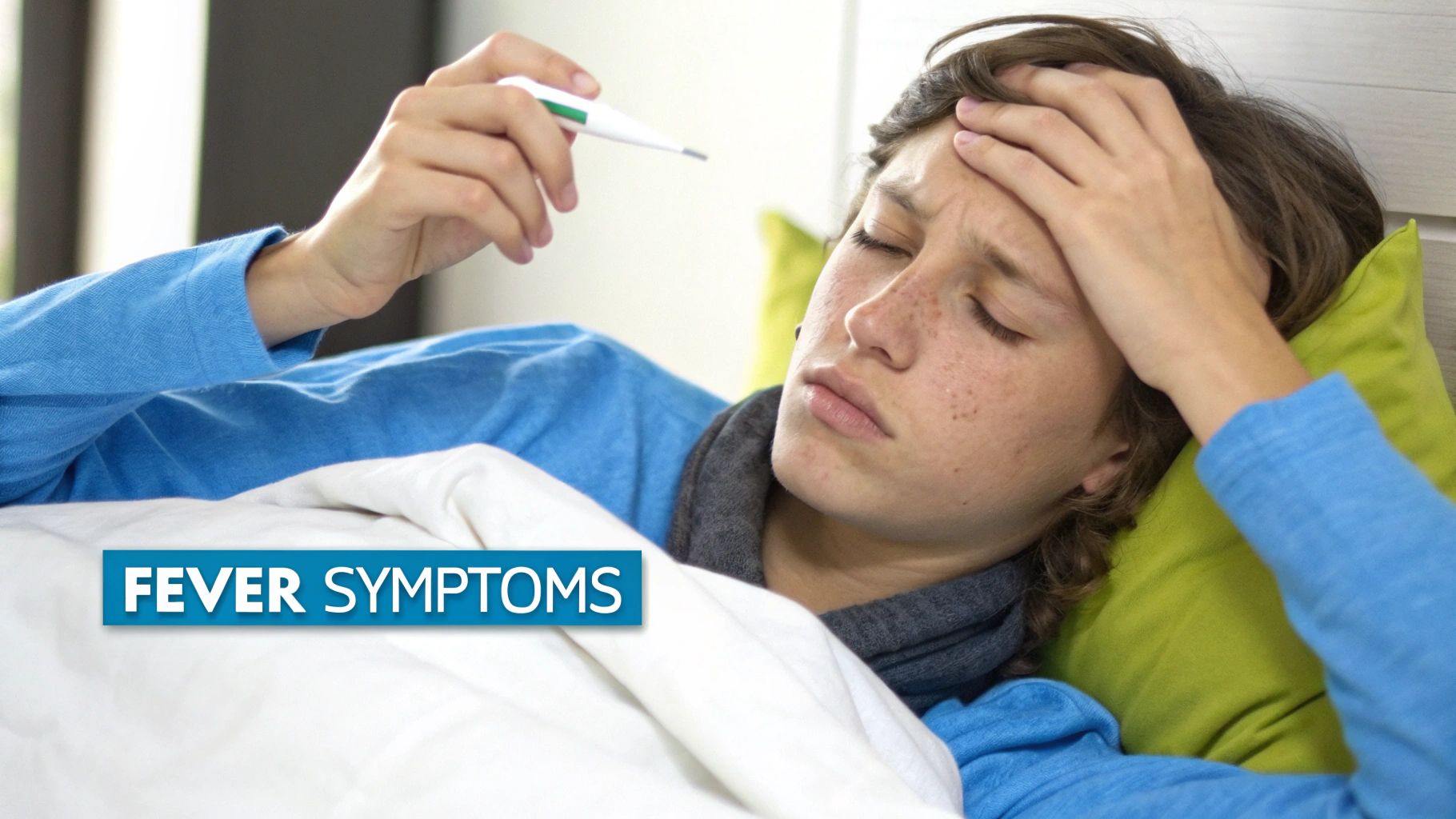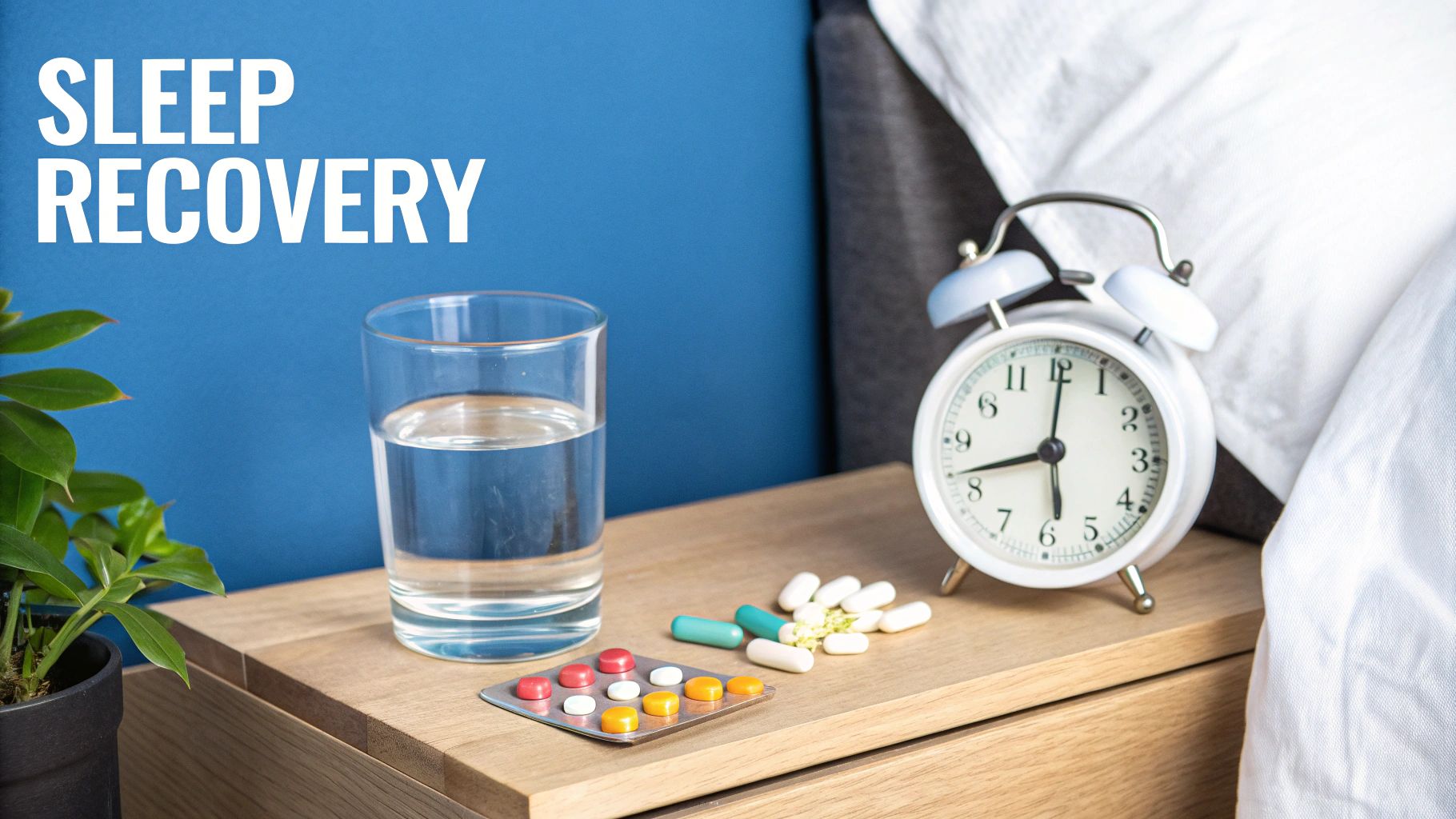So, can a lack of sleep actually cause a fever? While the technical answer is no, that’s not the whole story. Sleep deprivation doesn't directly crank up your body's thermostat, but it does leave the door wide open for the things that do.
Think of it this way: not getting enough sleep is like firing your body's security team. It weakens your immune system, making you far more vulnerable to the viruses and bacteria that cause infections. And what's a classic sign of your body fighting an infection? A fever.
The Vicious Cycle: Sleepless Nights and Feverish Feelings

Imagine your immune system is a highly trained, elite security force. Sleep is the critical time when this team regroups, resupplies, and strategizes for the next day's threats. When you skimp on sleep, that force becomes sluggish, disorganized, and slow to respond to an invader.
This is where the connection to fever becomes crystal clear. An exhausted, poorly defended body is an open invitation for germs to move in and set up shop. When an infection takes hold, your immune system finally kicks into gear, and one of its main weapons is raising your body temperature to create a hostile environment for the invaders. Voilà, you have a fever.
While losing sleep itself won't make the thermometer spike, it’s a major accomplice. It dismantles your defenses, essentially setting the stage for illness to walk right in.
This explains why you often feel rundown, achy, and just plain off after a night of tossing and turning. Your body is already struggling. On top of tanking your immunity, severe sleep deprivation messes with your internal thermostat, a process called thermoregulation.
This disruption can trick you into feeling like you have a fever even when you don't. You might experience:
- Feeling chilled or suddenly flushed without an actual change in your core temperature.
- Weird hot and cold flashes that feel suspiciously like fever symptoms.
- A general sense of being achy and unwell.
In short, a lack of sleep creates the perfect storm for getting sick. It weakens your guard and mimics the very symptoms of the illnesses it helps cause.
Sleep Deprivation and Fever: A Quick Look
To put it all together, here’s a simple breakdown of how sleepless nights can indirectly lead to a feverish state. It's not a direct cause-and-effect, but a chain reaction that leaves your body vulnerable.
| Factor | Direct Effect of Sleep Loss | Indirect Path to Fever |
|---|---|---|
| Immune System | Reduces the production of infection-fighting cells (cytokines). | A weakened immune system is less effective at fighting off viruses and bacteria, leading to infections that cause fever. |
| Thermoregulation | Disrupts the body's ability to regulate its internal temperature. | Can cause fever-like symptoms such as chills and hot flashes, making you feel sick even without an actual infection. |
| Inflammatory Response | Increases pro-inflammatory markers in the body. | Chronic inflammation stresses the body, making it more susceptible to pathogens that trigger a fever response. |
As you can see, while sleep loss won't spontaneously give you a fever, it's a key player in creating the conditions where a fever is much more likely to develop.
How Sleep Loss Dismantles Your Immune System
Think of your immune system as a highly trained, elite military unit. Sleep is when this unit gets its downtime—a crucial period to rest, re-arm, and map out the strategy for the next day's fight against germs. When you cut that rest period short, the entire defense system starts to break down.
Without enough quality rest, your body can’t produce enough cytokines. These are essential proteins that act as the immune system's messengers, telling disease-fighting cells where to go and what to do. It’s like an army with its communication lines cut; soldiers are left wandering aimlessly, unsure of where the battle is. This communication breakdown is exactly what allows viruses and bacteria to get a foothold.
Weakened Soldiers on the Front Lines
Beyond just breaking the lines of communication, sleep loss directly hobbles your immune soldiers. Key fighters like T-cells, which are your body's special ops for identifying and destroying infected cells, just don't work right when you're exhausted. Their ability to lock on and attack invaders drops significantly, leaving your gates wide open.
This diagram gives a great visual of how insufficient sleep can throw your body's core systems completely off-balance.

As you can see, sleep deprivation messes with everything from your hormones to your body's ability to regulate its own temperature, creating a cascade of internal stress.
The consequences are clear and have been shown time and again in research. A lack of sleep directly impairs the immune system, which massively increases your risk of catching the very infections that cause a fever in the first place. Studies have shown that sleep deprivation suppresses T-cell function while simultaneously boosting inflammatory cytokines—the exact molecules that can trigger a fever. This isn't just a minor inconvenience; it's a critical breakdown in your body's resilience.
A tired body is a vulnerable body. Even just one night of poor sleep can leave your immune cells unprepared for battle, weakening your ability to fight off the very illnesses that bring on a fever.
Ultimately, the answer to can lack of sleep cause fever becomes much clearer: it weakens your defenses so profoundly that you become a prime target for the infections that do. It's all connected. This is why making rest a priority is one of the most important things you can do for your health. To learn more about how quality rest supports all your body's functions, check out our guide on the health benefits of a good night's sleep.
Your Body's Thermostat and the Impact of Poor Sleep

Your body has an incredible internal thermostat, a sophisticated system called thermoregulation that works around the clock to keep your core temperature right where it needs to be. Think of sleep as the nightly tune-up for this vital system. When you don't get enough sleep, that thermostat gets thrown completely out of whack.
This is exactly why a sleepless night can leave you feeling weirdly cold or suddenly flushed, even when you aren't sick. Your body is struggling to manage its temperature, sending confusing signals like hot and cold flashes that can feel a lot like the beginning of a fever. That unsteady, "almost sick" feeling is the direct result of your internal climate control going haywire.
How Deep Sleep Prepares You for Battle
The most restorative parts of our sleep cycle, especially deep sleep, are all about conserving energy. During these stages, your body dials down its temperature and metabolic rate, essentially stockpiling resources. This energy reserve is absolutely critical for putting up a good fight—including a powerful fever—when a real threat like a virus or bacteria shows up.
Mounting a fever is a serious, energy-draining process. By cranking up your body's temperature, your immune system makes it a miserable place for pathogens to hang out, but this requires a ton of fuel.
Without enough deep sleep, your body just doesn't have the stored energy it needs to launch an efficient counter-attack. Your fever might not be as strong, which could drag out the illness and make recovery tougher.
Research backs this up. While not getting enough sleep won't directly give you a fever, it messes with both your thermoregulation and your immune system, creating the perfect storm for a fever to take hold once you're actually infected. Normally, your body would try to get more deep sleep to save energy for a strong fever response. But when you’re already sleep-deprived, that whole process breaks down, leaving you more vulnerable.
Making sure your bedroom supports a stable body temperature is a huge piece of the puzzle. For a deeper dive, check out our guide on finding the best temperature for sleep.
Scientific Evidence Linking Sleep Loss to Illness
That feeling you get when you’re run down and know you’re about to get sick? It’s not just in your head. The connection between losing sleep and catching a bug is backed by some pretty solid science. We've moved past simply knowing that it happens and can now point to exactly how much it matters. The data is clear: skimping on sleep opens the door for fever-causing illnesses to walk right in.
For years, researchers have been digging into this, putting real numbers to the vague concept of a "weakened immune system." What they've found isn't a small correlation; it's a strong, consistent link showing that when sleep goes down, your susceptibility to infections goes way up.
The Numbers Don't Lie
One landmark study put this risk into perspective. Researchers discovered that people sleeping less than six hours a night were nearly three times as likely to catch the common cold as those who got more than seven hours of shut-eye.
So what's going on here? That spike in infection rates comes down to measurable changes in your body's defenses. Key immune cells that are critical for hunting down and destroying viruses and bacteria just don't work as well. If you want to dive deeper into how sleep deprivation impacts these cells, you can check out this detailed research summary.
The bottom line is simple but powerful: sleep is a non-negotiable part of your body's defense system. Consistently missing even an hour or two can have a real, negative impact on your ability to protect yourself.
While getting enough quality rest is one of the most effective things you can do to stay healthy, it's also worth remembering that your environment plays a role, too. For instance, there are many health problems linked to dirty air ducts that can make you sick. Ultimately, though, the evidence is overwhelming—prioritizing sleep is a practical, powerful step toward staying resilient against infections.
Practical Steps to Improve Sleep and Boost Immunity

It's one thing to understand that skimping on sleep can leave you vulnerable to a nasty, fever-causing bug. It's another thing entirely to take control of the situation. Fortifying your immune system really starts with nailing your sleep hygiene, and the good news is you can start making some real changes tonight.
These aren't just your run-of-the-mill tips. They're practical, proven strategies designed to give your body the deep, restorative rest it needs to fight off whatever comes its way.
Create a Relaxing Wind-Down Routine
Your body craves signals. It needs to know when it's time to power down from a busy day and shift into rest mode. Kicking off a calming routine about an hour before you plan to sleep is the best way to send that message loud and clear.
- Ditch the Screens: That blue light coming from your phone, tablet, and TV is a real troublemaker. It actively suppresses melatonin, the crucial hormone that manages your sleep-wake cycle. Power them down at least 60 minutes before your head hits the pillow.
- Embrace Gentle Activities: Pick up a physical book (not an e-reader!), put on some chill music, or do some light stretching. The idea is to slow your heart rate and quiet that racing mind.
- Take a Warm Bath: A warm bath or shower does more than just relax your muscles. When you get out, your body temperature drops quickly, which naturally cues your brain that it's time for sleep.
A consistent pre-sleep ritual is one of the most powerful tools you have. It trains your body to fall asleep faster and stay asleep longer, which directly supports your immune health.
Optimize Your Sleep Environment
Think of your bedroom as a sanctuary dedicated purely to rest. The goal is to eliminate anything that might jolt you awake or prevent you from sinking into a deep sleep. A few small tweaks here and there can make a world of difference.
Your bedroom should be a cool, dark, and quiet oasis. Making sure the space is comfortable and well-ventilated is a huge piece of the puzzle. You can dig deeper into how skylight and ventilation solutions create a healthier and more comfortable living environment to really dial in your setup.
Of course, sometimes the problem isn't the room—it's us. Many of us fall into the trap of "sleep procrastination," where we knowingly delay bedtime. If that sounds familiar, getting to the root of that habit is key. We've got a great guide on why we procrastinate sleep and how to stop it that can help you get back on track.
A Few More Questions About Sleep and Fever
Let's wrap things up by tackling some of the most common questions people have about the link between being tired, feeling feverish, and actually getting sick. These quick answers should clear up any lingering curiosities.
Can Being Tired Make Me Feel Feverish Without a Fever?
Yes, this is an incredibly common feeling. When you're running on empty, your body’s internal thermostat—its thermoregulation system—really struggles to keep things balanced. This is why you might suddenly feel chilled, flushed, or get those weird hot-and-cold flashes.
These sensations can perfectly mimic the start of a fever, even when a thermometer confirms your temperature is completely normal. Think of it as a clear signal that your body's core systems are under stress and can't function properly without restorative sleep.
It's your body's way of sounding an alarm. That "feverish" feeling without a high temperature is often an early warning sign that your system is compromised and needs immediate rest to recover and defend itself.
How Quickly Does Lack of Sleep Affect My Immune System?
The impact is surprisingly fast. Research shows that even a single night of poor sleep—we're talking just four or five hours—can dramatically reduce the activity of your most important immune cells. These are the frontline soldiers that identify and take down invaders.
When this becomes a pattern, your immune system is left in a constantly weakened state. This makes you much more vulnerable to catching whatever virus or bacteria is going around, which raises the odds you'll end up with an infection and a real fever.
Can Getting More Sleep Help Me Recover Faster?
Absolutely. Sleep is one of the most powerful tools your body has for recovery. When you're sick with an infection, your immune system kicks into overdrive, and it does its best work while you're in the deepest stages of sleep.
During this time, your body ramps up the production of the specific cells and antibodies needed to fight off that particular bug. Prioritizing rest allows your body to dedicate all its energy to this crucial battle, which can help shorten how long you're sick and lessen how bad you feel. There's a reason "get plenty of rest" is timeless medical advice.
When Should a Fever Be a Reason to See a Doctor?
While poor sleep can make you more susceptible to illness, the fever itself is a symptom of an underlying infection. It’s important to know when that symptom means it's time to call in a professional.
You should consult a doctor if a fever:
- Is persistently high (over 103°F or 39.4°C for an adult)
- Lasts for more than three days without getting any better
- Comes with other severe symptoms like a stiff neck, confusion, difficulty breathing, or a severe skin rash
When in doubt, always trust your instincts and seek medical advice.
Ready to invest in truly restorative rest? The experts at DubsLabs design products like our ultra-comfortable Bedphones and weighted blankets to help you achieve the deep, healing sleep your immune system needs. Explore our sleep solutions at https://www.dubslabs.com and start building a stronger defense tonight.











































